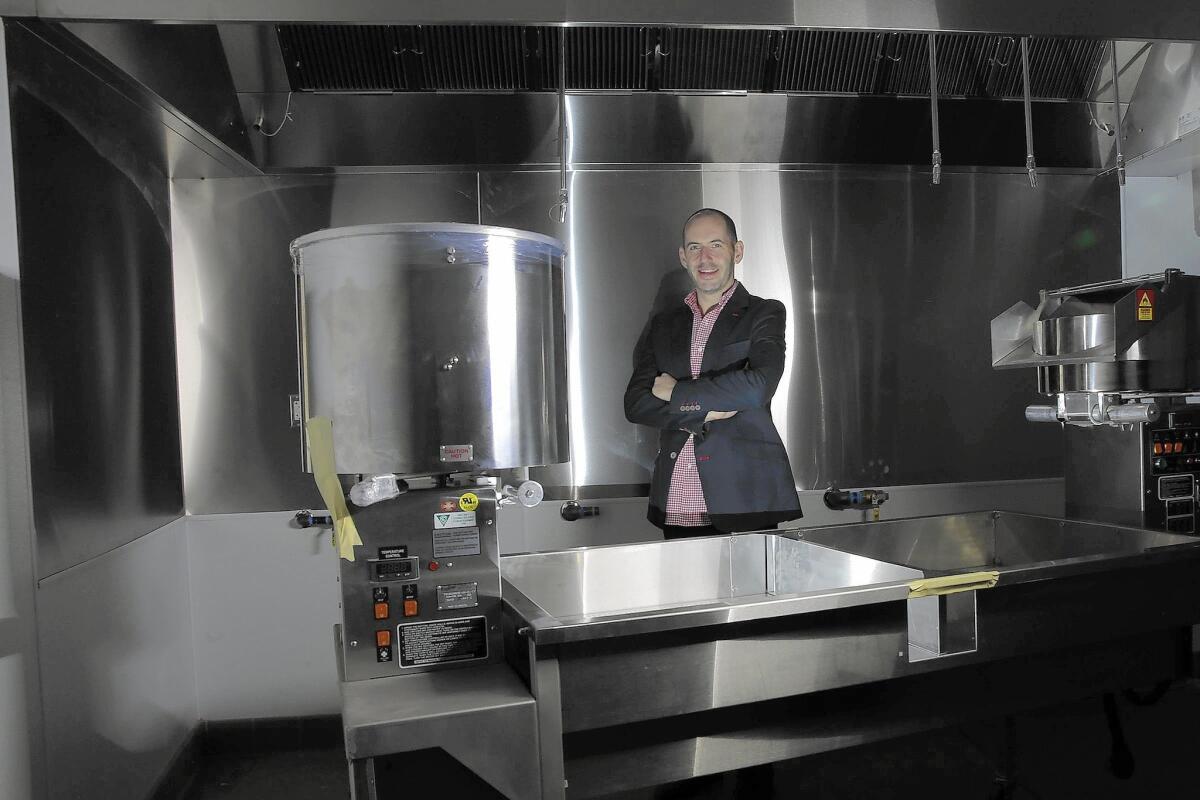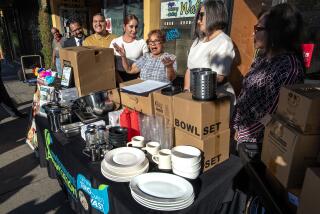At L.A. Prep, artisanal food makers can rent their own kitchens

Matt Walton’s caramel corn was a hit. Gourmet shops were clamoring for more, hooked on a recipe handed down by his grandmother.
But Walton hit a wall. He couldn’t find a commercial kitchen to expand production.
His company was too big for his home, and too small to afford the tens of thousands of dollars needed to renovate a leased space to meet health codes.
A new project in Lincoln Heights called L.A. Prep is aimed at helping Walton and a growing number of local artisanal food manufacturers that are primed to one day hit the shelves of Costco or Trader Joe’s.
Located in a 56,000-square-foot industrial building, L.A. Prep will rent 54 commercial kitchens outfitted with stoves, stainless-steel countertops and walk-in refrigerators to tenants, who can come and go as they please.
“There really isn’t a place for the people in between like me,” said Walton, who founded his Zlicious Confections in 2012 and signed a one-year lease for a 333-square-foot kitchen at L.A. Prep at $3,600 a month. “There’s a huge need for this.”
Shared kitchens and food incubators and accelerators have grown in response to the rise of specialty foods — think small-batch snacks, cheese and olive oils that show up in pricey delis and your neighborhood Whole Foods.
The specialty foods industry grew 21% from 2012 to 2014 to $109.6 billion, according to the New York-based Specialty Food Assn.
Many in California — the epicenter of the artisan food business — have been aided by the state’s cottage food law, which was enacted two years ago allowing the production of food in homes for limited sale.
The challenge for new producers is how to scale up at an affordable cost, which is why many of the current small commercial kitchens for lease allow entrepreneurs to share space or even rent by the hour. (Some restaurants will also defy laws by renting out their kitchens to small food manufacturers.)
Many turn to co-packers, contracted manufacturers that serve several food producers. That’s cheaper than leasing a kitchen but comes with less control over quality and flexibility with production volumes.
Walton of Zlicious currently uses a co-packer but is looking forward to the flexibility of his own kitchen at L.A. Prep just in case he has to fill a big order from a major retailer.
Other avenues for up-and-coming food businesses include universities. Rutgers in New Jersey and Oregon State University are among a few institutions that operate food innovation centers, which focus on development rather than full-scale production.
Some leased commercial kitchens are mission-driven, such as La Cocina in San Francisco, which serves low-income food entrepreneurs in the Mission District.
None, however, approach the scale of L.A. Prep.
“Most of them are much smaller,” said Ron Tanner, vice president of philanthropy and government and industry relations for the Specialty Food Assn., who counted 110 food incubators across the country. “This is a very ambitious project. They aren’t looking so much for businesses in the start-up phase but maybe people in business for two to three years.”
Set to open later this month if all goes well, L.A. Prep will house bakers, paleo diet chefs, pasta makers and a butcher, among others.
More than half the kitchens have already been leased at a cost of between $2,000 and $9,000 a month, depending on the size of the space.
They’ll all have access to loading docks, around-the-clock security, a demonstration kitchen and office space.
“It’s like an apartment building where everyone gets to share the gym,” said Mott Smith, one of the co-owners of the $18-million project and a longtime local developer. “There’s also economies of scale like a single contract for cleaning.”
Everything about L.A. Prep — including the floors, walls and sinks — was designed to meet health codes.
That was a big sell for Angelo Bellomo, director of environmental health for the county Department of Public Health, who was contacted about the project three years ago when it was just an idea.
Because tenants use their own kitchen, it’s easier to trace any food safety problems to their origin — unlike with shared kitchens, which could involve numerous cooks and different equipment, Bellomo said.
“With a single kitchen it’s easier to establish accountability,” he said.
In addition to the county keeping tabs on L.A. Prep, an inspector from the U.S. Department of Agriculture will monitor the processing of meat.
That made all the difference for Susan Dane Setin and her husband, Jean-Claude Setin, a classically trained French butcher.
The couple plan to use L.A. Prep as their industrial kitchen to break down carcasses and then open three or four retail shops to sell the meat.
“If we didn’t find this place, it would have inhibited our growth projection and entire business model,” said Dane Setin, who met her husband visiting his butcher shop in Nice while she was living abroad in France. “L.A. Prep allows us to use the hub-and-spoke model.”
Le French Butcher, as the business is called, will sell grass-fed beef along with lamb, pork and poultry. It will also offer prepared foods such as rotisserie chicken and charcuterie.
The pair are working with ranchers in California and Nevada and hope to soon get their hands on beef from a French breed of cattle called Salers, known for its marbling. Setin will carve out French cuts of steak hard to find in the U.S. such as the spider, a tender piece from the inside thigh.
“We want to meet the high-end niche market, supplying the best meat money can buy in Los Angeles,” said Dane Setin, whose 600-square-foot kitchen is equipped with a walk-in refrigerator, carving tables, a sausage maker and meat grinders.
By having so many artisans close to one another, Dane Setin expects many to exchange business ideas and even buy and sell one another’s products.
“We’re already talking to a tenant that needs animal fats for the paleo community,” she said.
Twitter: @dhpierson







